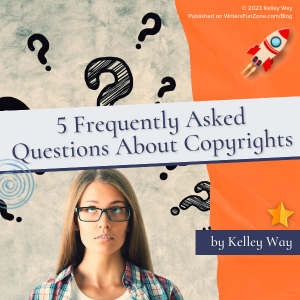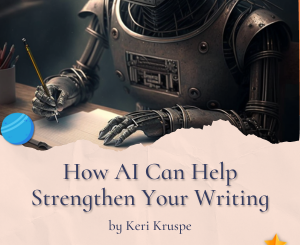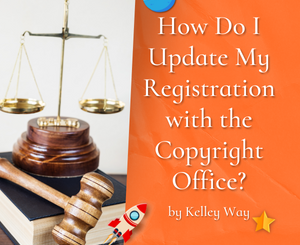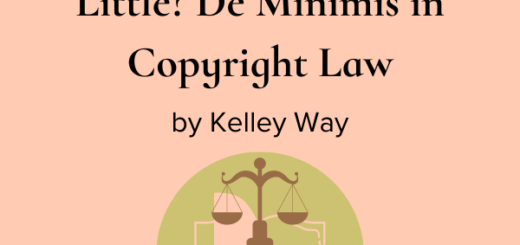5 Frequently Asked Questions About Copyrights by Kelley Way
 Let’s welcome back monthly columnist Kelley Way as she shares with us “5 Frequently Asked Questions About Copyrights.” Enjoy!
Let’s welcome back monthly columnist Kelley Way as she shares with us “5 Frequently Asked Questions About Copyrights.” Enjoy!
***
For this month’s article, I thought I’d answer some frequently asked questions about copyrights, with a focus on what is and is not protected by copyright. Let’s get started!
1. What is public domain?
“Public domain” is the term used for content that is not protected by copyright law.
Content that is in the public domain is either uncopyrightable, or the copyright has expired. That means that writers are free to use any public domain content without fear of copyright infringement.
2. How do I know if content is copyrighted or in the public domain?
Answering this question can be rather tricky — there are different rules that apply depending on when the work was published or created. Here’s some general guidelines:
- If the work was published before 1928, the copyright has expired and it’s in the public domain.
- If the work was published between 1928 and 1978 (the year the current Copyright Act took effect), then the work may or may not be in the public domain, depending on whether the owner followed all the formalities that were required under the previous Copyright Act.
- If the work was created on or after January 1, 1978, then the copyright is still in effect.
You can find a more detailed breakdown here.
3. Is AI content copyrighted?
Strictly speaking, AI content cannot be copyrighted, because copyright law requires that the author be a human. Therefore, anything that is 100% AI content is definitively in the public domain.
However, there is some gray area when people use AI as a tool in their creative process.
In this case, can the author only protect their contribution and not the material the AI created? Or is there a point where the human contribution is significant enough that the entire work can be copyright protected?
These are questions that we don’t have an answer for yet, and probably won’t until there’s a lawsuit that makes it to the higher courts.
4. Can I use content I found online?
There is a widely held belief that anything found on the Internet is free to use, perhaps because it’s so easy to copy.
Unfortunately, that is not true; content on the Internet is subject to the same copyright laws and protections as everywhere else.
That said, search engines have filters for content that has been tagged as free for others to use, and there are websites that offer content for free or at reasonable prices.
Just make sure that the website is legitimate, and/or that the content has been made available by the author and not an infringer.
5. Are quotes in the public domain?
That depends on the quote (I know, typical lawyer answer).
If the quote came from a copyrighted source (e.g. a book or a movie), then it is protected. If it’s something that someone said in passing, which was never recorded, then it should be fine to use.
Quotes that were said by one person but recorded by another are tricky (e.g. a remark from a celebrity during an interview).
In these cases it’s usually best to assume that the interviewer has a copyright, but the interviewee may potentially object on non-copyright grounds (e.g. right of publicity violation).
While you could fall back on fair use, it’s usually a better bet to simply ask permission.
Is there a burning question I didn’t answer, or a topic you’d like me to cover?
Let me know in the comments, or you can email me at kaway@kawaylaw.com.
***
Want to read more articles like this one Writer’s Fun Zone? Subscribe here.
***
ABOUT THE AUTHOR
Kelley Way was born and raised in Walnut Creek, California. She graduated from UC Davis with a B.A. in English, followed by a Juris Doctorate. Kelley is a member of the California Bar, and an aspiring writer of young adult fantasy novels. More information at kawaylaw.com.







